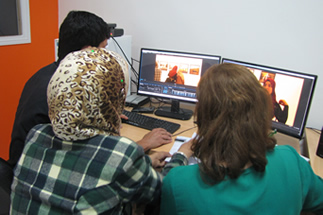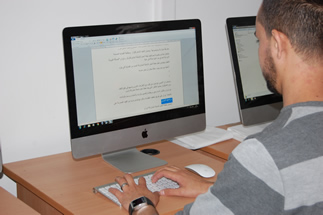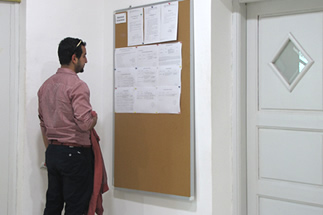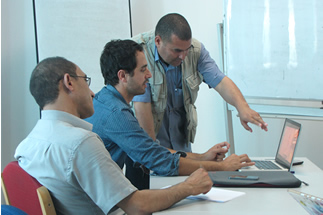The department is a unit of teaching and research providing in one of the sectors or specialties: preparatory training, postgraduate training, doctoral training and scientific research activities.
Training courses offered at the National School of Journalism and Information Sciences are supported by two departments:
SCIENCE OF INFORMATION DEPARTMENT
The Department of Information Sciences is created to strengthen the educational structures of the school. It is composed of three Master specialties: Media & Society and Culture, Geopolitics of Media and Institutional Communication.
The training has a dual purpose: academic for students who wish to continue their research in the field of Information Science and Communication; and a professional vocation that will allow graduates to practice communication skills in public or private institutions.
- Media & Society and Culture specialty offers both theoretical and practical training on media and journalism and their social and cultural anchor. This specialty will provide students with new knowledge on law, advertising, media sociology and new information and communication technologies. It trains future teachers and researchers in the field of Information and Communication Sciences.
- The geopolitical specialty of the media is a new way for students to explore the fundamental concepts of media geopolitics and to understand the international issues of the media today. It uses theoretical and methodological tools to facilitate the work of analysis and decryption of media (vectors, content and actors). Graduates of this Master's degree can exercise in the communication cells of state institutions such as ministries (foreign affairs, interior, ...), or as specialized journalists.
- The Institutional Communication specialty : This Master is intended to train specialized executives in communication at the level of companies and institutions in the public and private sectors. It allows future executives to participate fully in the management of their businesses and institutions through an education that apprehends tools for analysis and perception of the administrative, legal, economic and communication environment in which institutions operate.
The three streams are open to candidates holding a degree in the following specialties: Information and communication sciences, sociology, political science, legal sciences, graduates of the National School of Administration and Economic Sciences.
- KEBOUR Fatma. Keynote speaker. Head of Department of Information Science
 JOURNALISM DEPARTMENT
JOURNALISM DEPARTMENT
The journalism department provides specialized training aimed at training journalism professions, old and new. Backed by a mixed education that values both theory and practice, the aim of these courses is to offer ready-to-use journalists to the job market. At the end of this training, graduates of the school's journalism masters will find professional opportunities in press companies, as they will have the opportunity to pursue doctoral training.
The journalism department coordinates three specialized fields.
- The practical journalism specialty: This training is both theoretical and practical thanks to the epistemological base of the CIS on which it is based and the resources provided by the school to reinforce the practicality of the field. This course is open to the following sectors: Bachelor's degree in Information Science and Communication, Bachelor's degree in Political Science, Bachelor's degree in Law, Bachelor's degree in Administrative Sciences, Bachelor's degree in Social Sciences, Bachelor's degree in Arabic literature, Bachelor's degree in foreign languages.
- Audiovisual Journalism and New Media: It meets the pressing needs of the Algerian market which has a huge deficit in this area. It is an opportunity for learners because of the high demand of the market. This training is open to the following subjects: Bachelor's degree in Information and Communication Sciences, Bachelor's degree in Political Science, Bachelor's degree in Social Sciences.
- Scientific journalism: This training is the added value of our school, it is based on the background of students and the acquired knowledge of their initial training to meet the needs of understanding of Algerian society. This training is open to the following sectors: Bachelor's degree in exact sciences, Engineers, architect, graduates in medical sciences.
- SADOUNE Nesrine. Keynote speaker. Head of Journalism department
THE DEPARTMENTS MISSIONS
MISSIONS TO STUDENTS
- Organization of teaching
The department is responsible for providing students with all the educational tools necessary for the good training progress.
- The end-of-studies thesis
Each student must prepare a end-of-studies thesis. The departments of "Information Science" and "Journalism" have prepared a practical guide to facilitate the writing of thesis and to avoid certain errors that may affect the quality of the work presented.
The department's mission is to organize the defense of students' master's thesis. In this sense, the filing of the memorials, the convocation of the defense jury and the follow-up of the folder is done at its level. In addition, he coordinates with the direction of studies for graduation.
- Follow-up of the dissertation after defense
The students are asked to deposit the final copy of the dissertation at the level of the department so that its services proceed to the validation of the diploma. Students whose judging committee has reservations are invited to make the specified changes and submit them on time.
- Management of exams and appeals
At the departmental level, students will find answers to questions concerning the organization of exams, possible remedies, and different forms of mediation between teachers and students.
- Management of absences
All absences must be justified, either during the semester or during exams. The students enrolled in one of the 6 sectors, will deposit the justifications at the level of the secretariat of the departments.
- Election of the group delegates
The department is in charge of organizing the election of the group's delegate, who will be the interlocutor of the administration and the teachers and will mediate between the three parties. Delegates are elected at the beginning of the academic year.
- Practical information
The department responds to all the students' questions and ensures that they follow their course.
MISSIONS TO TEACHERS
For the smooth running of the academic year, the department also provides assignments to teachers, permanent and temporary to ensure the smooth running of the training.
- Co-ordination of teaching
The department ensures the co-ordination between teachers in monitoring the content of all the subjects taught, assisted by the pedagogical committees.
- Time management
For any spatiotemporal organization of the courses, seminar or catch-up session, the departments of the departments provide their support and their direct involvement according to the requests made by the teaching staff.




